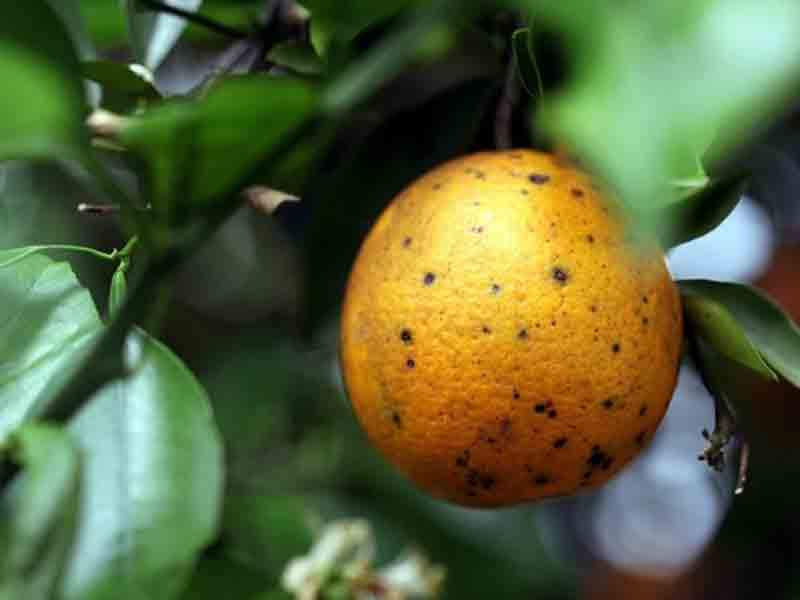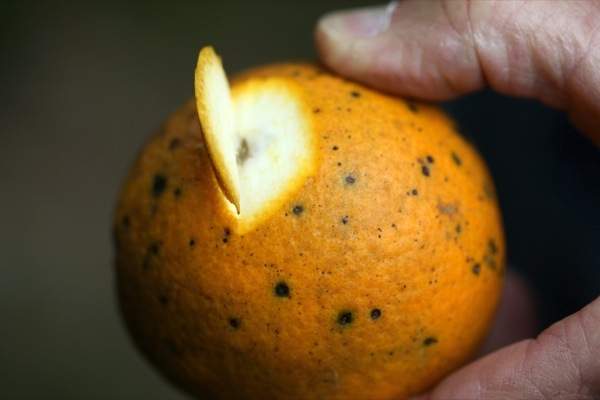http://www.theledger.com/article/20100506/NEWS/5065062/1002
Polk County Growers spared so far
Citrus Black Spot Spreading
State ag inspectors find 10 new cases of the fungal illness in South Florida.
 An orange with black spot in a tree Tuesday April 13, 2010 in Immokalee, Florida. CINDY SKOP/ THE LEDGER 2010
By Kevin Bouffard
An orange with black spot in a tree Tuesday April 13, 2010 in Immokalee, Florida. CINDY SKOP/ THE LEDGER 2010
By Kevin Bouffard
THE LEDGER
Published: Thursday, May 6, 2010 at 5:38 p.m.
Last Modified: Thursday, May 6, 2010 at 5:38 p.m.
LAKE ALFRED | As citrus black spot spreads slowly and inevitably across Florida, state and federal officials Thursday offered the beginnings of a strategy to fight the fungal disease.
 A piece of fruit infected with black spot is cut to show how the diesease does not infect the meat
A piece of fruit infected with black spot is cut to show how the diesease does not infect the meat
Tuesday April 13, 2010 in Immokalee, Florida. CINDY SKOP/ THE LEDGER 2010
"I don't know how big this will get. We'll have to wait until next year," Megan Dewdney, an assistant professor of plant pathology at the Citrus Research and Education Center in Lake Alfred, told an audience of 292 people at seven teleconference sites across the state.
That's because the first confirmed black spot cases surfaced only in late March, Dewdney said, so Florida citrus growers and researchers have little experience to go by. Although the disease first surfaced in Australia in 1895, local climate conditions affect how fast and far it spreads.
Since the first two black spot cases were confirmed in Immokalee groves March 29, inspectors have found nine other outbreaks in Collier County and last month a case in a Hendry County grove about 14 miles away, said Denise Feiber, spokeswoman for the Florida Department of Agriculture and Consumer Services.
The state has surveyed all groves within a 7-mile radius of the Immokalee find and has begun a similar survey in Hendry, she said. The department also conducted surveys along the U.S. 27 corridor in southern Polk, Glades and Highlands counties and found no black spot.
Black spot is a fungus that causes unsightly lesions on the surface of all citrus fruits, Dewdney said. The lesions mean the fruit can't be sold as fresh, but the disease does not affect juice quality, so it can be processed for OJ products.
Although 95 percent of the Florida orange crop and more than 60 percent of its grapefruit goes to juice, growers must take measures against black spot because it causes fruit to drop from the tree before it can be harvested.
In Brazil, where black spot surfaced in 1980, up to 80 percent of the fruit dropped prematurely in groves taking no control measures, Dewdney said.
Earlier, Dewdney and Natalia Peres, plant pathologist at the Gulf Coast Research and Education Center in Balm estimated premature fruit drop in Florida could range from 5 percent to 20 percent.
But Dewdney on Thursday said researchers won't get a good idea on premature drop until they've studied the disease for at least a year.
The main vehicle for spreading the disease is dead leaves on the ground, Dewdney said. When those leaves get wet, they eject black spot spores into the air that land on the citrus rind.
A secondary cause of spread is through water falling on infected fruit, branches and leaves with lesions, she said. That's less frequent because those lesions are asexual.
Black spot could become a major problem for Florida's fresh fruit packinghouses because infected fruit may not show lesions before they've been packed and shipped, Dewdney said.
Seemingly uninfected fruit could arrive at its destination marred by black spotting, particularly fresh citrus exported to Europe and Japan, major markets for Florida citrus. Polk has several of the state's largest packinghouses.
There is no way to kill black spot spores on fruit through the packinghouse process, Dewdney said.
Researchers are working on projects to control leaf litter in groves that could reduce spread of the disease, she said. They're also looking at new fungicides that could kill the fungus in the grove and packinghouse.
But there's little chance of eradicating the fungus or stopping its spread in Florida because it thrives in climates with temperatures between 70 and 90 degrees and rainfall every 24 to 48 hours, Dewdney said. That's common in spring months when the risk to young fruit is greatest.
"I don't think we'll have any problems reaching those levels," she said.
[ Kevin Bouffard can be reached at
kevin.bouffard@theledger.com or at 863-422-6800. ]
This story appeared in print on page C7





